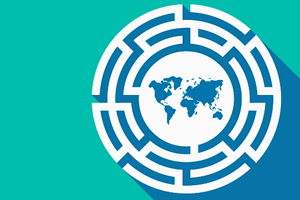
There are no shortages of crises in the world, and they continue to harm the education of the people affected. AACRAO continues its work to monitor these and provide resources and support for our members.
Our next webinar focuses on the continuing crisis in Venezuela and the evolving crisis and impact in Ukraine.
Ukraine
In early 2014, Ukraine's crisis centered on Crimea, which Russia invaded and then annexed early that year. In the ensuing years, ethnic Ukrainians and Crimean Tatars left Crimea while at least a quarter of a million people have moved from Russia to Crimea. In addition, thousands of Russian volunteers moved in to join separatist militias in the Russian-supported breakaway republics in Ukraine’s Donbas region.
Between 2013 and March 2017, sixteen universities and ten other higher education institutions were forced to relocate to Kyiv, Kryvyi Rih, Kramatorsk, Severodonetsk, Kharkiv, and other cities, due to the violence. In addition, in 2014, the leading university in Luhansk, Luhansk Taras Shevchenko National University - also known as the University of Luhansk or LNU-evacuated to locations outside of Luhansk, although remaining in the region. One indication of the difficulty facing these institutions in exile is that LNU is now spread across five cities in the region.
On February 28, 2022, Russian President Vladimir Putin officially recognized the independence of the republics of Donetsk and Luhansk after Russian military forces invaded Ukraine. As a result, universities in the region have been forced to remove computers and records and house them elsewhere. Even if they are somehow not prevented from studying due to the conflict, many students and staff have likely activated or volunteered to serve their country in the war with Russia. Recent news reports have focussed on the plight of international students experiencing difficulties leaving Ukraine since the invasion.
Venezuela
In 2013, after 14 years in power as President of Venezuela, Hugo Chavez died of cancer. That same year, a steep decrease in oil price, sales of which had propelled the Venezuelan economy and supported spending on education and social programs, contributed to a precipitous economic decline compounded by continued spending at former levels by Chavez's replacement, Nicolas Maduro. By 2015, an exodus of millions of Venezuelans was in full swing. Peru and Colombia received the most Venezuelan refugees, with the United States receiving large numbers of Venezuelan professionals and those seeking to join family members in the US.
Among school-aged children in Venezuela, three million were estimated to have dropped out by 2018. In addition, university enrollments, which, by 2015 had more than tripled over 2000 levels, experienced steep declines as students dropped out for economic reasons and staff resigned even as pay was being increased in a desperate attempt to outrun four-digit inflation. Public universities remain the hardest hit, but the situation is dire for private universities as well.
How these crises affect US admissions, and international office personnel is the subject of AACRAO’s fourth Education in Crisis webinar. Presenters David Mihalyi (AACRAO), Tatiana McKenna (ECE, Inc), and Ana Villavicencio (EducationUSA REAC) will address issues such as availability of documentation, the effect of COVID-19 on availability of physical copies of records, student mobility, student health, and flexibility of practices during this webinar.
Join the discussion on March 23, 2022, from 2:00 p.m. - 3:15 p.m. to discuss the current state of affairs in Ukraine and Venezuela and how we can support students in crises.